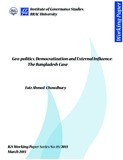| dc.contributor.author | Chowdhury, Faiz Ahmed | |
| dc.date.accessioned | 2019-04-02T05:31:18Z | |
| dc.date.available | 2019-04-02T05:31:18Z | |
| dc.date.copyright | 2013 | |
| dc.date.issued | 2013-03 | |
| dc.identifier.uri | http://hdl.handle.net/10361/11662 | |
| dc.description | Background paper for The State of Governance in Bangladesh 2013. | en_US |
| dc.description | IGS Working Paper Series No. 05/2013 | |
| dc.description | Includes bibliographical references (pages 18-23) | |
| dc.description.abstract | Bangladesh’s strategic importance is enormous as it is located at the heart of two very important
regions of the globe and might turn out to be a hub in South and Southeast Asia. Recognizing the
country’s strategic significance, a number of influential nations are now vying for influence over
the country for strategic access and economic resources. This paper focuses on some key
interests of the external actors especially important regional and global powers as they try to reap
the benefits of Bangladesh’s strategic location in their favour. In fact, Bangladesh has attracted
keen interest from the United States, China and India in recent times. These powers compete
with each other for a variety of reasons to influence Bangladeshi politics with convergent as well
as contradictory interests. The paper examines how geography shapes the nature of external
actors’ influence in this part of the world. The strategically important Chittagong port offers both
economic and potential military opportunities for the aforementioned powers. Apart from that,
the rise of Islamist militancy in Bangladesh, trade and connectivity has made it an area of
immense interest among big powers to exert their influence. The paper would explore how lack
of democratic consolidation in a country creates the room for external forces to intervene in the
internal affairs. The paper develops a conceptual framework to analyze drivers of external
influence in Bangladesh. It builds on Lee’s (1966) ‘Push-pull theory’ of migration studies. Since
the restoration of democracy in the 1990s, Bangladesh has conducted four free and fair national
elections. Bangladesh’s democratic transition has not been smooth and still the country is in the
process of consolidating its fragile democracy. The future of Bangladesh’s democratic
consolidation is far from predictable considering its weak democratic institutions and repugnant
political culture enabling the external actors to play an important role in its politics and policy
making. | en_US |
| dc.description.statementofresponsibility | Faiz Ahmed Chowdhury | |
| dc.format.extent | 23 pages | |
| dc.language.iso | en | en_US |
| dc.publisher | BRAC University | en_US |
| dc.rights | BRAC University reports are protected by copyright. They may be viewed from this source for any purpose, but reproduction or distribution in any format is prohibited without written permission. | |
| dc.subject | Democracy | en_US |
| dc.subject | Geo-politics | en_US |
| dc.subject | External influence | en_US |
| dc.subject | Zero-sum’ game | en_US |
| dc.title | Geo-politics, democratization and external influence: the Bangladesh case | en_US |
| dc.type | Working paper | en_US |
| dc.contributor.department | Institute of Governance Studies, BRAC University | |

